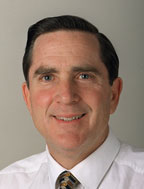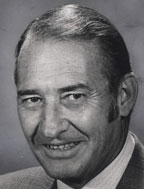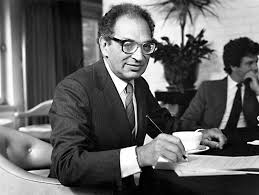By Katie McNulty
As business editor and as a business columnist for the San Jose Mercury News, Mitchell used his writing to keep his audience grounded as Silicon Valley was experiencing astounding technology and economic accomplishments.
Mitchell, a native of California, grew up in Santa Barbara. Upon graduating from Yale in 1967, he went on to study at the University of Wisconsin and earned graduate degrees in Latin American studies and journalism.
He received his first newspaper job at the Charlotte Observer. Mitchell then went on to the San Diego Union as a business reporter.
For Mitchell, 1977 was an exciting year. That was the year that he married his wife, Susie Sutton. It was also the year that he became the business editor of The San Jose Mercury News.
“He was business editor of the San Jose Mercury News at a time when technology news was developing into a very powerful era, and he was on the early stages of developing sophisticated coverage of technology business,” said Michael Millican former business editor of the Associated Press.
As business editor, Mitchell reminded his team to learn from lessons in history and to keep things in perspective.
During the ’70s and ’80s, Silicon Valley was an important economic center, and technology was at the heart of it. At a time when news coverage of business tended to be perfunctory and routine, Mitchell and the journalists at the Mercury News significantly elevated the public’s understanding of business news in general and technology news in particular.
“The improvement of coverage of business technology and the development of business technology in Silicon Valley went hand in glove, and Jim was a key part of that,” said Millican.
While Mitchell was at the Mercury News, he was an influence in the stunning increase of staff members in the technology department. The staff started with 12 members, but by August 2000 there were 70 business journalists, a full television studio in the newsroom, and an online website.
“To have a staff of over 50 is just astounding,” said David Beal, former Society of American Business Editors and Writers president and former business editor for the St. Paul Pioneer Press.
Mitchell left the business editor position at the Mercury News in the early ’90s to become a full time business columnist at the paper. As a business columnist, Mitchell wrote about the expansion of Silicon Valley and topics such as the dot-com boom and the high increase in stocks of technology companies. The stock increases of the dot-com boom eventually led to the dot-com crash in the early 2000s.
Many young reporters flocked to Silicon Valley to cover the boom in technology, but they lacked what Mitchell had: a homegrown council.
“He brought a long term view as to where technology was going, where San Jose fit in that growth pattern and how things worked in the city. He knew more than just business,” said Peter Hillan, former executive business editor of the Mercury News when Mitchell was a business columnist.
Hillan continued, “Jim provided the steady reminder that San Jose used to be orchards.”
Mitchell was important to business journalism during this time because he helped his audience to remember where San Jose used to be, and there is value providing this perspective. This is what set Mitchell apart from the rest of the journalists covering Silicon Valley.
In 1984, Mitchell was the president of SABEW. As president, he oversaw the expansion of its headquarters at the University of Missouri. The following year he went to Stanford to study as a Knight Fellow.
Mitchell had a long and successful career. Mitchell led and developed the business department up until the early ‘90s during a significant transition of growth. He left the Mercury News when he felt as if the transition was complete, and he wanted to spend time with his family.
“Everybody enjoyed his company. He was very wise and experienced,” said Hillan.
In January of 2005, Mitchell died of salivary gland cancer. He is survived by his two sons, Jack and Rob.
Katie McNulty is a native of Barrington, Ill., and an advertising major in the Class of 2015 at the University of North Carolina at Chapel Hill.


